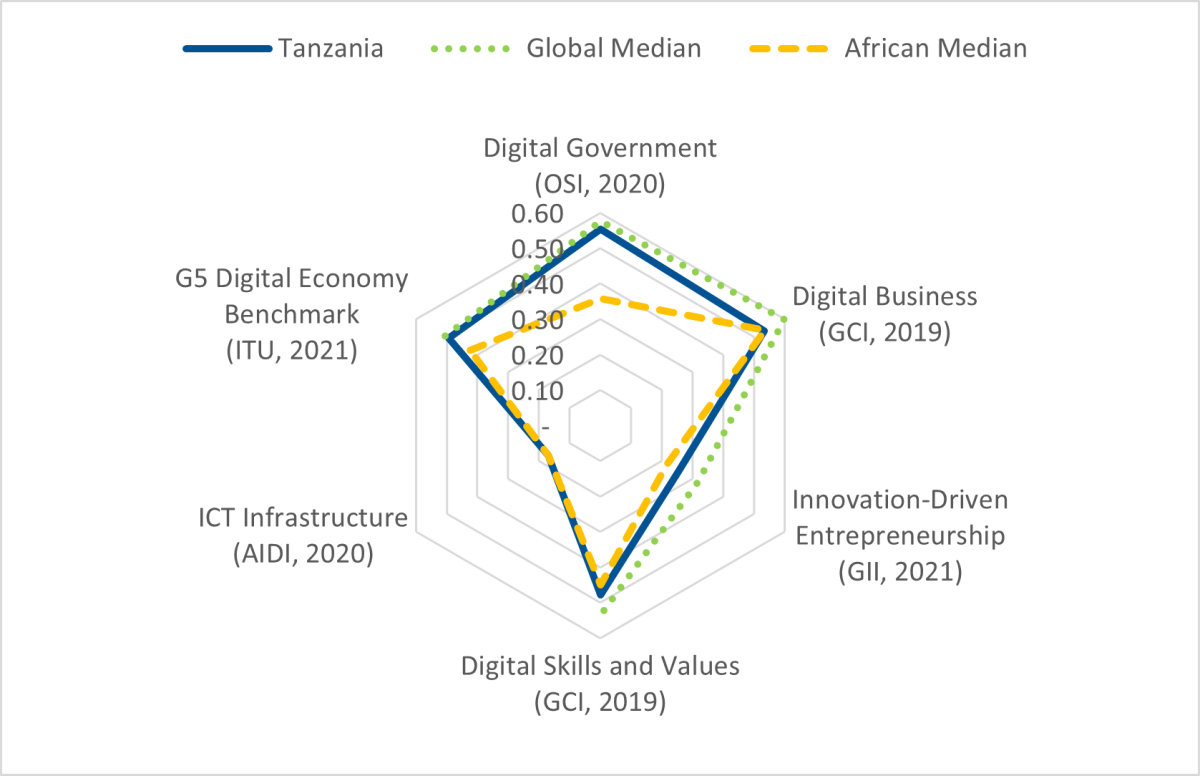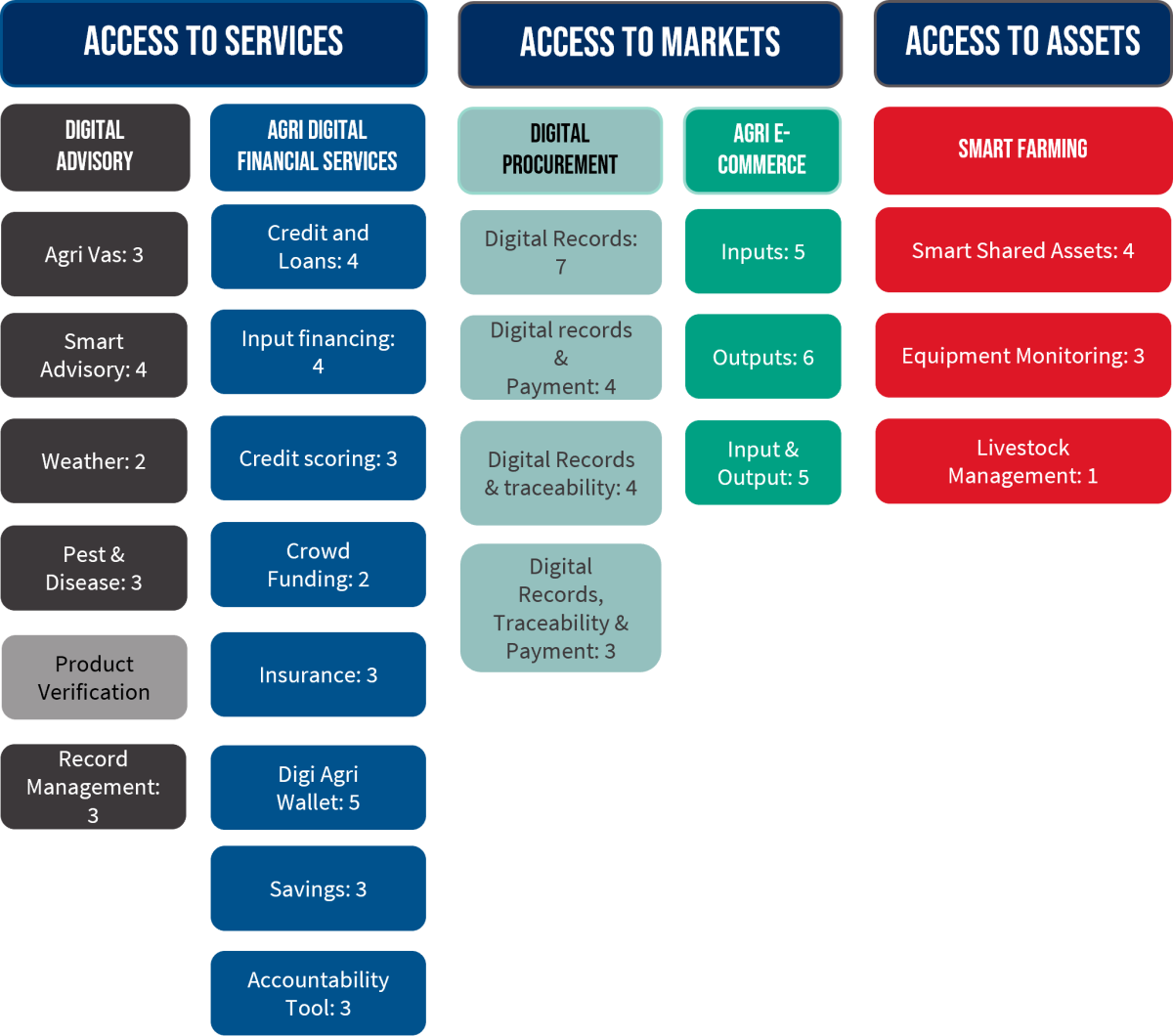Caption: Interactive map presenting country specific data, including universities and incubators contacted for the study and the digital innovations identified at the time of the study
Full country profile (PDF)
Tanzania Ranked 5 out of 16 Countries in the Benchmark
The benchmark assessment reflects the extent to which Tanzania is unlocking positive pathways towards a digital economy and supporting a vibrant ecosystem of different actors.

Caption: Results from Benchmark Assessment for Tanzania
Tanzania is ranked 5 out of 16 in the benchmark assessment which suggests that it has some key foundational elements necessary for a robust digital economy.
Tanzania ranked in the top half of the SADC member states for all pillars except ICT infrastructure (which identifies the availability of affordable, accessible, resilient, and reliable infrastructure).
| Group | Country | Benchmark Index Score (Adjusted) | Overall Benchmark Ranking |
|---|---|---|---|
| 1 | South Africa | 0.5891 | 1 |
| Mauritius | 0.5839 | 2 | |
| Seychelles | 0.5155 | 3 | |
| Global Median | 0.5064 | ||
| 2 | Eswatini | 0.4222 | 4 |
| Tanzania | 0.4138 | 5 | |
| Botswana | 0.4114 | 6 | |
| 3 | Zimbabwe | 0.3895 | 7 |
| Namibia | 0.3809 | 8 | |
| Lesotho | 0.3802 | 9 | |
| African Median | 0.3595 | ||
| Zambia | 0.3506 | 10 | |
| Malawi | 0.3483 | 11 | |
| Madagascar | 0.3005 | 12 | |
| 4 | Angola | 0.2985 | 13 |
| Mozambique | 0.2919 | 14 | |
| DR Congo | 0.2782 | 15 | |
| Comoros | 0.2497 | 16 |
Caption: Overall Benchmark Assessment Results and Rank for all SADC member states
For further information on the benchmark results and regional trends please read the Situational Analysis Report.
Digitalization Within Agriculture Policies and Strategies is Still at an Early Stage
The benchmark indicated that Tanzania is unlocking the digital economy and that there is likely a supportive enabling environment in place.
The baseline of policies and strategies identified that digitalization is being prioritized but more needs to be done to incorporate emerging technologies.
There are some notable gaps that could be problematic, greater focus must be put on ensuring trust, privacy, protection of consumers and for businesses. Regulations and frameworks will be required to better integrate ICTs into agricultural value chains to ensure related digital issues are addressed.
No specific sectoral strategy or policy on digitalization within agriculture was identified. It seems that digitalization within the agriculture sector is still at an early stage.
Agriculture has been integrated into key national plans as a priority but will need to remain adaptable to more emerging technologies and issues around privacy and trust.
27 Innovations were Identified in Tanzania with Digital Procurement and Agri E-Commerce the Most Common
All use cases were present in Tanzania: digital advisory, agri-digital financial services, digital procurement, agri e-commerce and smart farming. Digital procurement and agri e-commerce were the most common use cases.

Caption: Diagram illustrating number of identified innovations and their sub use case solutions.
Innovations in Tanzania are spread across the value chain with access to markets, on-farm production, and input stages as the most common.

Caption: Diagram illustrating number of innovations identified in each phase of the value chain.
Innovations targeted a wide range of outcomes: addressing poor access to markets, knowledge gaps, financial exclusion, and low productivity.
Major challenges experienced by innovators included a lack of digital literacy in their target customers, limited access to a device, farmer uptake and behavior change and a lack of mobile network coverage.
Digital Agriculture Training Skills Are Available Through Incubators and Innovation Hubs but Infrastructure in Rural Areas is a Challenge
In Tanzania, digital skills in agriculture have great potential to stimulate economic growth and improve the livelihoods of many households. The lack of sufficient infrastructure, especially in rural areas, is a challenge in the implementation of digital education in schools and learning institutes.
National research and education networks in Tanzania and the SADC region should be strengthened so that they can effectively play their role of providing affordable interest connectivity infrastructure and value-added services for successful digital agricultural economies.
The incubators and innovation hubs in the agricultural sector seem to collaborate with universities and their curricula on digital agricultural skills. These collaborations must be developed and encouraged as they can be an important driver for innovation and entrepreneurship.
Icons - credit to NounProject https://thenounproject.com/






